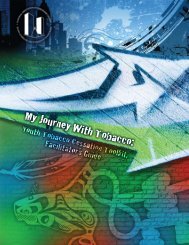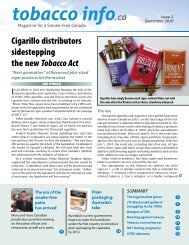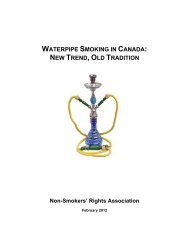Tobacco-Free Sports and Recreation Policies
Tobacco-Free Sports and Recreation Policies - New Brunswick Anti ...
Tobacco-Free Sports and Recreation Policies - New Brunswick Anti ...
Create successful ePaper yourself
Turn your PDF publications into a flip-book with our unique Google optimized e-Paper software.
<strong>Tobacco</strong>-<strong>Free</strong> <strong>Sports</strong> <strong>and</strong> <strong>Recreation</strong> <strong>Policies</strong><br />
Accomplishments of the TFSR Evaluation<br />
A central goal of collecting data from multiple PHUs <strong>and</strong> respondents of varied age, sex, <strong>and</strong><br />
roles in the hockey community was to capture a range of views about TFSR policy. The findings<br />
further the underst<strong>and</strong>ing of TFSR policy implementation <strong>and</strong> provide evidence of progress<br />
towards the “Play, Live Be…<strong>Tobacco</strong>-<strong>Free</strong>” intermediate <strong>and</strong> long-term outcomes.<br />
This evaluation offered all participating public health units <strong>and</strong> hockey teams an opportunity to<br />
revisit <strong>and</strong> stimulate TFSR policy <strong>and</strong> associated messaging. In addition, the evaluation provides<br />
varied, case by case insights into TFSR policy impacts across different age groups.<br />
From a capacity-building st<strong>and</strong>point the evaluation strengthened, <strong>and</strong> in some cases was an<br />
introduction to, the research process. Two of the Case Study sites engaged PHU youth in survey<br />
collection <strong>and</strong> focus group data collection activities. PHU staff also spoke of their involvement in<br />
data collection <strong>and</strong> fieldwork <strong>and</strong> reported that the evaluation had bolstered their focus group<br />
facilitation skills <strong>and</strong> increased their research capacity. Such experience was deemed useful for<br />
future research initiatives.<br />
Key Lessons<br />
The key lessons of the TFSR policy implementation experiences are:<br />
• Hockey settings (organizations <strong>and</strong> venues) are perceived to be valuable <strong>and</strong> effective<br />
sites to promote TFSR messages across prevention, protection <strong>and</strong> cessation areas.<br />
• Impacts of TFSR policy implementation include a reduction in exposure to second-h<strong>and</strong> smoke.<br />
• People want change, including smokers. There is general agreement that a smoke-free<br />
sports <strong>and</strong> recreation environment is important <strong>and</strong> that a tobacco-free policy does not<br />
infringe upon the rights of tobacco users.<br />
• Change can be achieved but continuous <strong>and</strong> sustained efforts are not easy. Champions at<br />
the local level are vital.<br />
• One of the most salient findings of this evaluation was that TFSR messaging is very<br />
important (e.g., signage, logos). The messaging can help to sustain the momentum of the<br />
TFSR efforts even if the policy itself has received limited to no attention or review within<br />
the hockey team setting.<br />
• A final lesson from the case studies is that implementation <strong>and</strong> long-term change will not<br />
be achieved without a multi-pronged approach (e.g., policy reminders, tobacco-free<br />
events, logos/promotional materials, signage/ advertising, swag for players).<br />
Ontario <strong>Tobacco</strong> Research Unit 62





